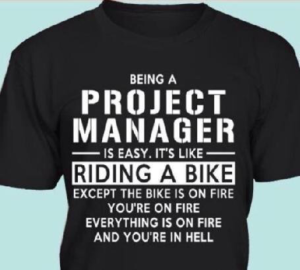“Between agile and automation, project management is going away. There may be jobs with that title but the work will be very different.” — Kevin Brennan
I saw the above quote today on Twitter. Just like a couple of weeks ago, I was totally taken aback. Agile and automation doesn’t take away what a really good project manager can do. These are methodologies and tools that a project manager can use to deliver projects better. When I asked my husband, a software engineer, what he thought of the quote, he suggested that maybe these would drive the non-technical project managers into extinction.
I guess it all really begs the question of what does or what should a good project manager do? I’ve been asked to help train someone on how I run implementation projects, so I guess I should start putting to paper the criteria around what I do and why it allows me to deliver on implementation projects. I will start by saying that all project managers are not equal. This is a big part of the reason that many technical resources are so critical of the PMO and project managers. They don’t see the value and often feel that the project manager just adds work to the technical resources.
Above anything else, a good project manager should remove obstacles from the team and the project. This might be resource alignment, or a dependency from another department, or almost anything. Status meetings, project documentation and stakeholder management are merely manifestations of this work. The catch here is that the project manager needs to be technical enough to fully understand the nature of technical issues, and work with resources on getting them what they need to resolve them.
Second, a good project manager has the analytics wherewithal to assist business and technical resources. On the business side, the project manager can help bridge that gap between that user story or business requirement to the details of how functionality works, to ultimately helping coordinate the validation efforts further offloading work from the technical project team. On the technical side, the project manager with strong analytic foundations can step in at any point from requirement interpretation to design to validation/QA.
A natural curiosity can also differentiate a good project manager. The ability to ask questions and drill into the details yields a great project management dividends. It shows your stakeholders and project team that your interested in what they have to say, and is instrumental in the trust building required to successfully deliver. Very few projects run without hitches. The desire to ask why can broaden the range of solutions, ultimately resulting in a successful implementation despite the twists and turns.
A good project manager will balance tenacity with adaptation. Too much happens too quickly these days for project managers to stagnate within in a set methodology, toolset or process. We too often see project managers so set in their ways, unfortunately often following the PMI rulebook to its smallest minutia. The moment the project offsets the delicate balance (of the PM), the delivery becomes jeopardized. Come to the table with your preferred methodology and toolkit, but be willing to be flexible during the project implementation. Ultimately, the project manager will be more successful.
At the end of the day, I don’t think being a good project manager is really difficult. I think a shift in mindset and the ability to constantly learn can make you successful. I’ll continue to do what I do and deliver projects. In the meantime, I’ll leave you with this description of a project manager, sent to me by a former coworker. He hadn’t been a fan of project managers until he had the opportunity to work with me on a project. In addition to the several job referrals, he sends me funny project management memes.
